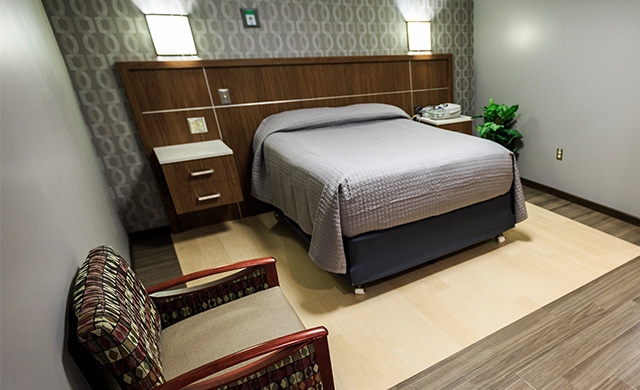
Good sleep can improve your health, mood, work, and relationships. Start your journey to better rest by meeting with an Englewood Health provider in New Jersey. Trust your care to professionals with advanced training in their field. Our providers have board certification and/or fellowship training in sleep medicine.
Sleep Disorders We Treat
Find a diagnosis and treatment for sleep-related disorders such as:
- Insomnia – Trouble falling asleep or staying asleep
- Restless leg syndrome (RLS) – Pain or itchiness that makes you want to move your legs and keeps you awake
- Periodic limb movement disorder – Leg and foot movement and muscle twitching during sleep
- Narcolepsy – Daytime sleepiness
Sleep disorders can affect many parts of your body. So you may see a specialist in neurology or respiratory care in addition to a sleep doctor and your primary care provider.
Sleep Testing and Diagnosis
To find out if you have a sleep disorder, your Englewood Health doctor may ask you to take part in a test such as a:
- Home sleep study – Uses a portable device to check your vital signs as you sleep in your own bed
- Overnight study at the Englewood Health Center for Sleep Medicine (pictured above)
- Maintenance of wakefulness test – Shows if you can stay awake for a certain period of time
- Multiple sleep latency test – Records how fast you fall asleep during the day
- Polysomnogram – Measures your vital signs, brain waves, and movements while you stay in a sleep lab overnight
Expect your test results as soon as possible. We’ll send them to your referring provider and the sleep doctor who ordered your study.
Comfortable Rooms & Facilities
Your sleep study may take place at the Comprehensive Sleep Center at Broadway Medical Center in Fair Lawn. Stay in one of six private bedrooms that offer a spa-like atmosphere and include:
- Full bathroom
- 40-inch high-definition television
- Comfortable recliners
- Thermostat you can control
Sleep Apnea
If you snore loudly or gasp for air when you sleep, ask your doctor if you have obstructive sleep apnea (OSA). This common condition causes poor-quality sleep and can lead to:
- Irritability and depression
- Increased risk of high blood pressure, heart problems, and stroke
- Morning headaches
- Daytime sleepiness
Risk Factors for Sleep Apnea
You face a higher risk of sleep apnea if you are overweight or male. The risk increases as you age.
Treatment for Sleep Apnea
Your treatment for sleep apnea may start with lifestyle changes, such as sleeping on your side, avoiding alcohol, and losing weight. Your doctor may also recommend:
- A mouthpiece to keep your airways open while you sleep
- A continuous positive airway pressure device (CPAP) that gently blows air into your throat during sleep
- Surgery to widen breathing passages
Sleep Apnea Follow-Up Tests
If you’re diagnosed with sleep apnea, your doctor may order one of these studies before you start treatment:
- CPAP titration study – Fits your CPAP mask and sets the airway pressure
- Oral appliance therapy titration – Fits your mouthpiece
- Positive airway pressure (PAP) nap study – Helps you use and adjust to a CPAP device as you sleep briefly under a technician’s watch